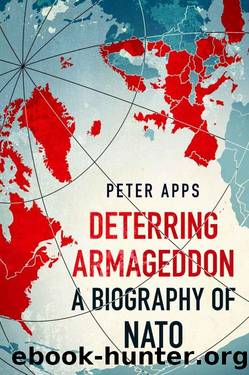Deterring Armageddon: A Biography of NATO by Peter Apps

Author:Peter Apps [Apps, Peter]
Language: eng
Format: epub
Publisher: Headline
Published: 2024-01-31T16:00:00+00:00
19
Kosovo (1999)
âI still think it was worth . . . it. The alternative would have been to tolerate ethnic cleansing in Europe. And I think thatâs no alternative you can accept.â
General Klaus Naumann, NATO Military Committee Chairman, 20001
For the first two weeks of 1999 it looked like Holbrookeâs diplomacy might just hold. Then a new massacre in Kosovo changed the game. Later investigations put the death toll at forty-five, an apparent retaliation for a Kosovo Liberation Army (KLA) attack on four Serb policeman. It was the brutality of the murders at RaÄak, however, that was truly shocking.
The first body encountered by US ambassador William Walker was of an old man who had been decapitated. âThey were killed where they lay,â he said, recounting finding a pile of almost twenty bodies.2 MiloÅ¡eviÄ accused Walker of bias, threatening to evict the entire OSCE mission â the one major concession Holbrooke had won the previous year with the threat of NATO bombing. After Bosnia, Western governments worried the 500 unarmed monitors might become hostages to the Serbs against bombing. Now they were keen to get them out of the way before any action started.3
Negotiations would go nowhere. MiloÅ¡eviÄ refused to leave Belgrade for talks in the French château at Rambouillet, wary of being arrested and dragged to the International Criminal Tribunal. Those he sent in his place, the US and NATO delegation quickly realised, lacked the authority to make decisions. On the Kosovo Albanian side there was disunity, what Holbrooke would later describe as âeighteen different people who spend most of their time arguing with each otherâ.4 At NATO, planning accelerated not just for airstrikes but the use of troops â even if, for now, no one was truly willing to countenance a full-scale invasion, least of all the United States. Clinton was under pressure from fellow Democrats â particularly Joe Biden, ranking member on the Senate Foreign Relations Committee. Wary of US overstretch, Biden said he would only support a NATO mission in Kosovo if the US was the smallest contingent.5
As March 1999 began it felt as though NATOâs history in Bosnia was repeating itself in Kosovo. NATO had 430 planes ready to strike â but no agreement on what to do with them. âWe are back to square one again,â said one Pentagon official. âNATO has pulled out the âwe are ready to actâ way too many times.â As Holbrooke headed back to Belgrade on 9 March the Yugoslav government announced new terrorism charges against several members of the Kosovan delegation taking part in peace talks. Compromise on either side was now all but impossible. Holbrooke warned that Yugoslavia and the West were on a âcollision courseâ.6
On 12 March, Poland, the Czech Republic and Hungary signed their accession to the North Atlantic Treaty. Polish President Aleksander KwaÅniewski described it as âthe most important moment in our historyâ. Czech President Václav Havel, jailed by the Communist regime, said membership meant that âwe will have a solid security anchoring for the first time in our historyâ.
Download
This site does not store any files on its server. We only index and link to content provided by other sites. Please contact the content providers to delete copyright contents if any and email us, we'll remove relevant links or contents immediately.
| Arms Control | Diplomacy |
| Security | Trades & Tariffs |
| Treaties | African |
| Asian | Australian & Oceanian |
| Canadian | Caribbean & Latin American |
| European | Middle Eastern |
| Russian & Former Soviet Union |
The Secret History by Donna Tartt(16662)
The Social Justice Warrior Handbook by Lisa De Pasquale(11494)
Thirteen Reasons Why by Jay Asher(7803)
This Is How You Lose Her by Junot Diaz(5800)
Weapons of Math Destruction by Cathy O'Neil(5048)
Zero to One by Peter Thiel(4835)
The Myth of the Strong Leader by Archie Brown(4796)
Promise Me, Dad by Joe Biden(4459)
Beartown by Fredrik Backman(4435)
Stone's Rules by Roger Stone(4423)
How Democracies Die by Steven Levitsky & Daniel Ziblatt(4414)
The Fire Next Time by James Baldwin(4352)
100 Deadly Skills by Clint Emerson(4086)
A Higher Loyalty: Truth, Lies, and Leadership by James Comey(4041)
Rise and Kill First by Ronen Bergman(4021)
The David Icke Guide to the Global Conspiracy (and how to end it) by David Icke(3892)
The Farm by Tom Rob Smith(3878)
Secrecy World by Jake Bernstein(3789)
The Doomsday Machine by Daniel Ellsberg(3738)
